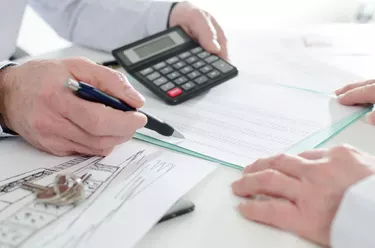
Consumers often come face-to-face with a few financial realities when they apply for credit or wish to finance a major purchase – and are denied. The reason? Too many outstanding loans and a large outstanding balance on their credit cards. It may feel like a searing rejection, but it's really not as bad as it sounds. It's a temporary state of affairs, and one you can improve as you pay back the loan and reduce your debts with a multistep action plan.
What Is an Outstanding Loan?
Video of the Day
An outstanding loan is one that has not yet been fully repaid. Be mindful of one point of distinction: If you've borrowed $20,000 from a bank to make home improvements and have paid back $15,000, the loan is still considered outstanding. The $5,000 left to be repaid makes it so. It will continue to carry the status of an outstanding loan until the entire amount is paid off.
Video of the Day
The $5,000 may also be called an outstanding balance. This is a term that you may see on a credit card summary statement. If your personal financial vocabulary case has room for another addition, try "current balance." This is another way of referring to an outstanding balance too.
The financial terminology is important – and not only because financial professionals often weave it into a conversation quickly and easily, assuming that laymen can keep up. Knowledge will build your confidence as you gain the upper hand on your finances. In this spirit, there is another term worth knowing if you're trying to reduce your debt: Debt-to-income ratio, which the Corporate Finance Institute says is of "the utmost importance to creditors." Just as its name suggests, the number is computed by dividing your total monthly debts – mortgage, credit cards, car and student loans – by your gross monthly income. While there may be no such thing as a universally ideal ratio, many lenders prefer one that is lower than 36 percent.
Consider Also: Difference Between Debt and Liabilities
Take Charge of Your Debts
Like many people who strive to pay off outstanding loans and other debts, you're smart enough to realize that creating a monthly budget lies in your future – but maybe not as the first step. It makes more sense to contact your lenders and creditors first to see if you can negotiate a lower interest rate. Simply making a request is hardly a guarantee that it will be granted, but if you can show that you've been dutifully making your payments on time, you might be pleasantly surprised by the receptiveness of the customer service or financial aid department. At the least, they may recommend that you "try again" in three months.
It's worth the attempt because a lower monthly payment on one debt will affect your monthly budget. The fundamental point of this exercise is twofold: To clarify exactly where your money is going and to look for a way to pare expenses. And herein lies the sweet spot because then you can take a huge step toward paying down your outstanding debt by creating a monthly debt reduction plan. It makes sense to target the debt with the largest outstanding balance or the one with the highest interest rate.
Devising Your Debt Reduction Plan
Either way, keep your debt reduction plan formula simple by making columns denoting the months of the year. Then, in three rows, note your "payment goal" and the "actual payment" before computing the "remaining debt." Even if you don't have leftover money each month to assign to your debt reduction plan, you've taken a hugely important start by making it a priority.
Experian offers three other solid pieces of advice: Check your credit score at least once a year, carefully consider taking on new debt (using credit to pay for things you don't have the savings to cover) and use your credit cards strategically. This means shopping for cards that offer cash-back allowances or travel miles for dollars spent.
Consider Also: Simple and Effective Strategies for Debt Reduction
In the end, no one action (barring a huge lottery win) will free you of your outstanding loans and debt. There are many moving parts to managing a financial action plan, and you're doing it yourself, without having to pay a single dollar to a financial adviser. That's a credit that deserves to be noted too.